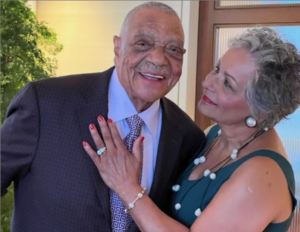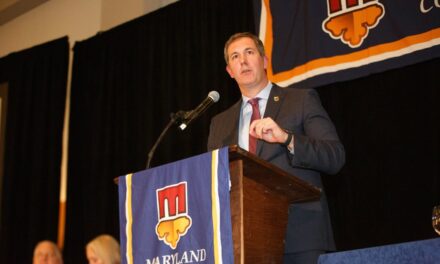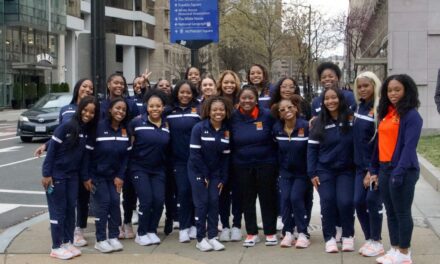By Stacy M. Brown | NNPA Newswire Senior National Correspondent
Earlier in 2022, representatives from Regions Bank, the PGA TOUR, historically Black Miles College, and others gathered at the Roebuck Hawkins Park and Recreation Center and municipal golf course in Birmingham, Alabama, for a panel discussion exploring diversity, representation, and access in golf.
The goal of that scantily publicized meeting was to get more Black youth onto the golf course.
Such efforts that receive little national attention might not necessarily be unfavorable.
On the contrary, it might pose as routine, particularly for Tour officials who have long made diversity, equity, and inclusion a primary goal.
The Tour has partnered with organizations like the 100 Black Men of America in its ongoing efforts.
In 2020, the PGA TOUR established a five-year partnership to help 100 Black Men of America to enhance educational and economic opportunities for African American and minority residents and communities.
According to the Tour’s latest diversity report, nearly 1,000 youth have benefited in two years from resources and programming that promote career and workforce readiness, financial literacy, community service, and golf.
Following Commissioner Jay Monahan’s 2020 announcement committing a minimum of $100 million over ten years to supporting nonprofits that advance equity in the communities in which the PGA Tour plays, the Tour joined the 3M Open as a presenting sponsor of the “Be The Change” golf tournament in Minneapolis.
The 3M Open hosted a series of events during its 2022 tournament.
They welcomed 500 youth from the Minneapolis and St. Paul area to the tournament to enjoy golf, music, art, and discussions with local and national celebrities, sports figures, golf enthusiasts, and corporate leaders.
Additionally, the tournament hosted a “Shark Tank” style business competition presented by a local sponsor that featured three finalists selected from nearly 50 applicants that pitched their businesses to a panel of business leaders before a live audience.
Grants totaling $100,000 were awarded to assist the finalists with mentoring, business development, and networking resources.
Golf also returned to Florida’s oldest HBCU, Edward Waters University.
THE PLAYERS Championship granted $50,000 to Waters’ women’s golf program, which helped support the school’s launch of a Student-Athlete Golf Mentoring Program.
The program counts as a dual-purpose initiative that engages student-athletes to serve as mentors in unique professional development environments – including exposure to career opportunities within the Tour and THE PLAYERS network – and off-campus volunteer experiences with community-based programs.
Further, after being inspired by a global awakening toward race relations in the United States following the 2020 murder of George Floyd, the Tour announced a $100 million commitment over ten years to support racial equity and inclusion efforts.
In delivering the Tour’s diversity, equity, and inclusion report, Monahan proudly announced that they’d achieved more than $40 million in charitable impact in just two years since the pledge.
“On the road toward that aggressive goal, we’ve spent the necessary time listening to understand,” Monahan stated.
“There isn’t a single solution or one-size-fits-all approach to addressing social inequities and injustices.
“Experiences differ. Issues are complex. And we must invest more than dollars in becoming a true and effective resource.”
Monahan noted that he’s grateful that the Tour is “uniquely structured in sports to bring our tournaments and corporate partners together to help organizations drive vital equity efforts.”
The diversity, equity, and inclusion report include a breakdown of the Tour’s priorities. The charitable impact for health and human services counted for $12.7 million, while $8.9 million have gone toward youth development.
Additionally, racial equity and social justice reform reaped approximately $7.5 million, and community economic growth and empowerment realized a $5.5 million impact because of the effort of the Tour and its partners.
In January, the PGA TOUR received a score of 95/100 on the Human Rights Campaign’s Corporate Equality Index, becoming the first major sports organization ever included.
Since its inception, the PGA Tour reportedly has generated more than $3 billion in charitable impact. Monahan said the investments directly result from the support of partners, players, sponsors, fans, volunteers, and communities.
In 2014, the PGA Tour adopted a strategic plan, “formalizing a long-held commitment to diversity efforts that strengthen its workforce, operators, and industry.”
Monahan then “convened a task force of leaders across the organization to assess its progress and identify specific actions, initiatives, and opportunities that reflect its core values,” PGA Tour officials stated.
The PGA Tour and Advocates Pro Golf Association Tour (APGA) launched the APGA Collegiate Ranking in 2021, providing exemptions for five African American golfers to play on the APGA Tour and the pre-qualifying stage of the Korn Ferry Tour Qualifying Tournament.
The Tour has provided $500,000 to HBCUs and its affiliation with the APGA Collegiate Ranking.
“As former Commissioner Deane Beman once stated, the PGA TOUR is ‘more than just a sports league; we are a public trust,’” Monahan said.
“With that as our North Star, our success as an organization is through a long-held commitment to showcasing the world’s best players to fans around the world, always with an impact on local lives, communities, and economies.”











